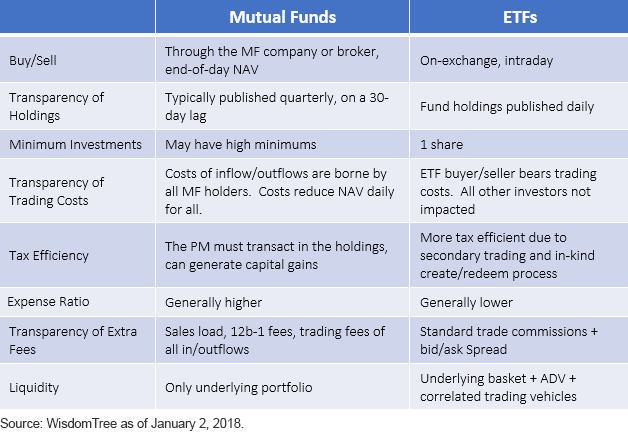ETFs vs. Mutual Funds: The Age-Old Question


One of the most common questions and discussion points we encounter is: “What are the key differences between exchange traded funds (ETFs) and mutual funds?” Both are investment vehicles designed to give the investor exposure to a basket of securities, but there are important distinctions between the two structures in terms of transparency, trading and tax efficiency. Our CEO, Jonathan Steinberg, likes to use the analogy that mutual funds are like black-and-white TVs and ETFs are like HDTVs in full color.

The first key difference between ETFs and mutual funds is transparency. The holdings of ETFs are published daily, so as an investor, you know exactly what you are holding. Mutual fund holdings are published quarterly and usually on a lagging basis. By the time the holdings are published, what the mutual fund actually holds could be quite different. Furthermore, ETFs are much more transparent in terms of trading costs. The ETF buyer or seller bears the trading cost without impacting other investors of the fund. Additionally, the trading costs are imbedded in the ETF spread, which the buyer or seller pays, plus commissions. For mutual funds, the costs of inflows and outflows are borne by all holders of the mutual fund. Any trading activity that occurs in the portfolio, such as trading to accommodate daily inflows and outflows, will impact those who hold the mutual fund. In terms of fees, many mutual funds have sales loads, 12b-1 fees and trading costs that are not transparent since they are not exchange traded. Many investors think they are getting net asset value (NAV) but in reality, it is NAV minus the unknown trading costs.
The second key difference between the two products is trading. A mutual fund investor can only receive NAV minus costs of a mutual fund at the end of each day. An ETF can be bought or sold throughout the entire trading day. Additionally, since an ETF is exchange traded, that adds a further layer of liquidity. Shares of an ETF have the potential to be passed back and forth on exchange without a transaction occurring in the underlying securities. This can potentially lead to cheaper costs compared to trading the underlying basket. This does not happen with a mutual fund. The portfolio manager will always have to transact in the underlying securities when buying or selling for an investor, especially in larger size.
The last key difference between mutual funds and ETFs is tax efficiency. While both structures are taxed equally on the individual level, the key difference occurs at the fund-holdings level. At the end of the year, if the fund had netted gains from selling securities, this amount must be distributed to the fund’s shareholders, who are then required to pay taxes on this distribution. ETFs are more tax efficient on the fund-holdings level due to their exchange-traded nature. Shares of the ETF can be passed back and forth on the exchange without creating turnover in the underlying portfolio, thereby reducing the chance for capital gains. The second contributing reason is due to the “in-kind” creation and redemption mechanism. Securities and ETF shares are exchanged between the authorized participant and the ETF issuer during a creation or redemption, free of payment, meaning no transactions occurred within the portfolio. Mutual funds have neither of these benefits, making them more prone to taxable events.
While ETFs and mutual funds are both a wrapper around a basket of securities, there are many key differences. ETFs provide much more transparency, flexibility, tradability and tax efficiency compared to their mutual fund counterparts. The investor knows exactly what he or she holds, and all of the costs and fees are transparent. Furthermore, an ETF investor will not be impacted by the actions of other holders of that ETF, whereas a mutual fund investor is at the mercy of other holders of that fund. So in a world of technology, would you prefer a black-and-white TV or a flat-screen color HDTV?
Important Risks Related to this Article
Neither WisdomTree Investments, Inc., nor its affiliates, nor Foreside Fund Services, LLC, or its affiliates provide tax advice. All references to tax matters or information provided on this site are for illustrative purposes only and should not be considered tax advice and cannot be used for the purpose of avoiding tax penalties. Investors seeking tax advice should consult an independent tax advisor.

